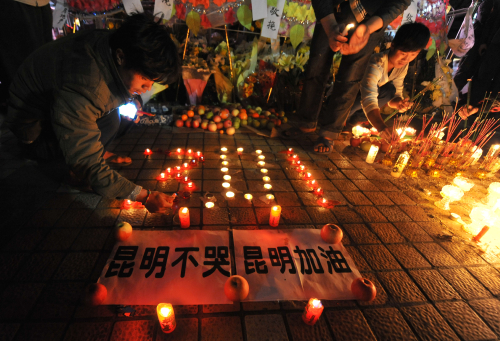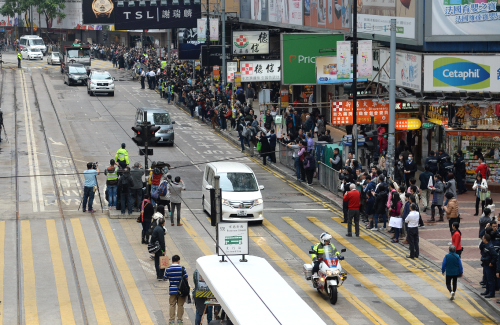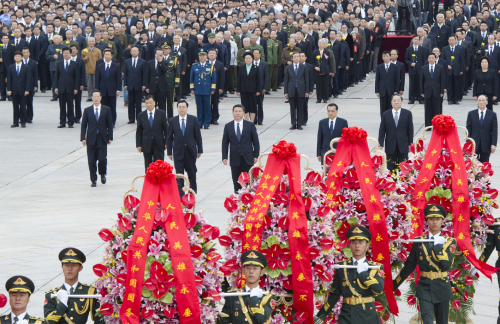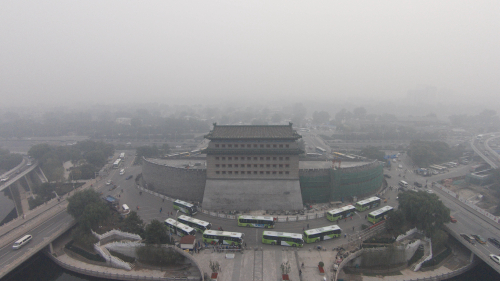|
 |
|
People light candles to mourn the victims of a terrorist attack at the square of Kunming Railway Station in Yunnan Province on March 3 (LIN YIGUANG) |
Fighting Terrorists
China has launched a joint mechanism to improve intelligence gathering for anti-terrorism efforts, according to a statement released by the Ministry of Public Security on November 12.
In late May, a year-long campaign against terrorism, focusing on the western Xinjiang Uygur Autonomous Region as the major battleground, was launched after an attack on a market in the regional capital Urumqi on May 22. The attack killed 39 people and injured 94 others.
Earlier on March 1, knife-wielding terrorists killed 29 innocent civilians and injured 143 at a train terminal in Kunming, the capital city of southwest China's Yunnan Province. Four of the perpetrators were shot dead by the police at the scene and four others were captured.
In July, the National Anti-Terrorism Leading Group Office released a counter-terrorism handbook, which urged citizens to be vigilant against any signs of terrorism.
 |
|
Tram lines reopen in Hong Kong's Causeway Bay after police cleared the last Occupy site in the region on December 15 (QIN QING) |
Occupy Movement Cleared
After Chief Executive of Hong Kong Special Administrative Region Leung Chun Ying delivered a report on Hong Kong's constitutional development to the top legislature of China, the NPC Standing Committee on August 31 made a decision that allows universal suffrage in selecting Hong Kong's chief executive from 2017 onward with two or three candidates nominated by a broadly representative nomination committee.
The Occupy Central movement started on September 28 when protesters blockaded several main roads and streets in Kowloon and Hong Kong Island to show defiance to the NPC Standing Committee's decision.
In the following more than two months, the Occupy Central movement caused serious traffic disruption, less tourists, temporary closure of schools and banks and a slump in Hong Kong's stock market trading. There had also been a series of clashes between protesters and the police.
The Hong Kong police cleared the last Occupy site on December 15.
Under Hong Kong's Basic Law and the decision of the NPC Standing Committee, more than 5 million qualified Hong Kong voters could have a say to who will become the chief executive in 2017 through the "one man, one vote" election, which was never realized under the British colonial rule.
 |
|
Chinese leaders offer flower baskets at the Monument to the People's Heroes in Beijing's Tiananmen Square on September 30, China's Martyrs' Day (HUANG JINGWEN) |
Paying Tribute
The Chinese top legislature approved the establishment of a national day to commemorate martyrs on August 31.
According to a decision by the NPC Standing Committee, Martyrs' Day will be marked with events across the country on September 30 every year.
It is the third national memorial day created in China this year, following Victory Day of the Chinese People's War of Resistance Against Japanese Aggression on September 3 and National Memorial Day for Nanjing Massacre Victims on December 13, both ratified by the NPC Standing Committee in February.
 |
|
The smog-shrouded Deshengmen Gate Tower in Beijing on October 9 (XING GUANGLI) |
Tackling Air Pollution
The State Council on November 26 passed an amended draft air pollution prevention and control law, which emphasizes addressing the sources, total discharge and density of pollutants.
The amended draft specifies punishment for violations such as discharging pollutants without a certificate, over-discharging pollutants and fabricating monitoring data. The amended draft has provisions on conducting coordinated control of multiple pollutants from coal burning, industry, automobiles and dust, as well as launching coordinated regional actions in key areas.
Since the beginning of 2014, rounds of smoggy days have become more and more frequent in China. The delta areas of the Pearl River and Yangtze River and the Beijing-Tianjin-Hebei region have been the severely hit areas. In order to tackle the problem, the Central Government allocated 10 billion yuan ($1.63 billion) in May to the three major industrial zones.
| 